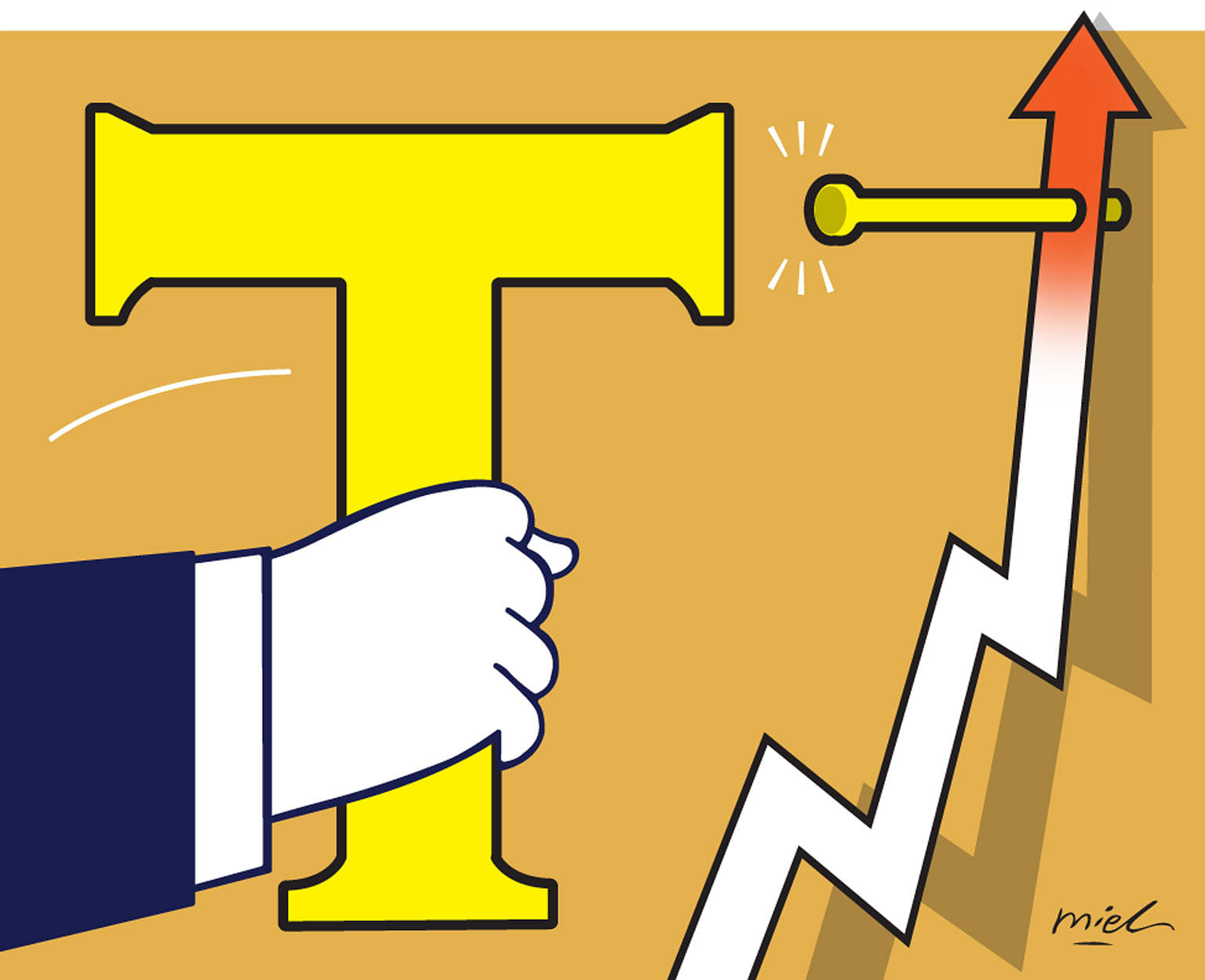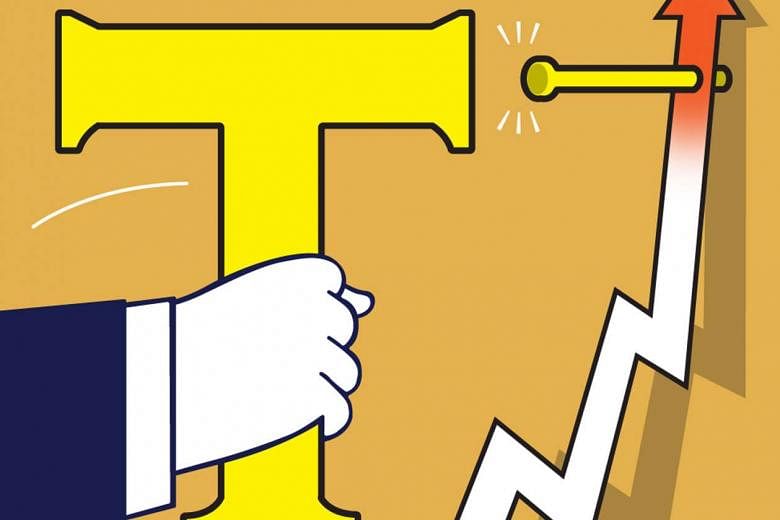What do US President-elect Donald Trump's picks for Cabinet appointments tell us about his likely economic policies?
Like the President-elect himself, his nominees as a group have expressed contradictory and inconsistent views that conflict with one another's and with his, making the outcome of future Cabinet deliberations highly uncertain.
On the campaign trail, Mr Trump excoriated Wall Street, big business and corporate lobbyists, promising to "drain the swamp" of "corrupt global elites" in Washington, DC. But his nominees include many from these very ranks - billionaire hedge-funders, Wall Street bankers and multinational chief executives.
One policy on which all the nominees agree with Republicans in Congress is tax cuts, which they believe will encourage investment, thus boosting economic growth. But this result is uncertain. Income tax cuts disproportionately benefit the higher-income earners because they earn the most income and thus pay the most taxes. But, inequality aside, the rich are also less likely to increase consumption out of higher post-tax incomes, and thus to stimulate overall demand - the mechanism by which fiscal stimulus increases growth.
Instead, savings will increase. According to one economic argument favoured by conservatives, even savings by non-high-income taxpayers will increase because they anticipate they will need to pay higher taxes in future to fund the Budget deficit resulting from tax cuts now.
HIGHER PRICES, NOT GROWTH
In any event, capital has not been scarce or costly for a long time - both because of a "global savings glut" and an unprecedentedly long period of central bank monetary stimulus that has kept world interest rates near zero. Several years of record-high US corporate profits and stock prices also indicate that low returns on capital are not the reason for low private sector investment.

Even if tax cuts increase consumption and investment, this is likely to lead to higher inflation rather than higher growth, given an economy already at full employment, with wages rising at a rate not seen for many years. This is why the Fed raised interest rates earlier this month and expects to do so several more times next year, to ensure that inflation does not exceed its 2 per cent target. Market actors' belief that higher inflation and interest rates are coming explains the boom in stock, and plunge in bond, prices since the election.
Labour shortages have already appeared in many sectors, particularly manufacturing (where tens of thousands of job vacancies are unfilled), agriculture, construction, hospitality and small business generally. These will worsen with the tightening of immigration and deportation of undocumented workers that were a signature promise of Mr Trump's campaign. Nominating Republican Senator Jeff Sessions, an immigration hardliner, for attorney-general confirms his intention to follow through.
There has long been bipartisan agreement on the need for a corporate tax cut from the current 35 per cent rate, one of the world's highest. While the Obama administration proposed a reduction to 27 per cent, Congressional Republicans led by House Speaker Paul Ryan have proposed a 20 per cent rate, and President-elect Trump, a 15 per cent rate.
Any cut would encourage US multinationals to return some of the trillions of dollars they now hold offshore in low-tax jurisdictions. But here again the impact on economic growth is uncertain. If repatriated earnings are mainly distributed to (relatively high-income) stockholders, consumption and investment may not increase (but inequality will).
Earnings repatriation would further strengthen the dollar, reducing US competitiveness, particularly in manufacturing, which is highly export-oriented. This will incentivise investment in automation, which would increase productivity (and incomes), but not if the skills required are unavailable, which would be aggravated by restricted immigration. In that case, companies may be better off moving more operations offshore to access scarce skills, benefit from the strong dollar's buying power abroad, and avoid its high costs at home.
Bottom line: Supply-side constraints (including an ageing population, shrinking labour force and low productivity growth) make it inevitable that the 3 per cent to 4 per cent growth target Mr Trump proclaimed will not be reached. Tax cuts are more likely to result in higher inflation and interest rates, which will eventually slow growth.
LARGER DEFICIT?
Besides tax cuts, Mr Trump has also proposed large increases in federal spending on defence and infrastructure. Here, there is less agreement among his nominees, and with Congressional Republicans, who would like to see reductions in popular entitlement benefits, mainly Social Security and Medicare. These already consume more than three-fifths of federal expenditures, a proportion that will increase with the ageing population and lower immigration (since immigrants are younger and contribute more to tax revenues than they claim in expenditures).
The last two times that Republican presidents cut taxes and increased defence spending (Mr Ronald Reagan from 1981-1989 and Mr George W. Bush from 2001-2009), the federal Budget deficit ballooned, saddling the country with a much higher national debt (now 80 per cent of gross domestic product), interest payments on which increase expenditures and rise with interest rates. It is the "fiscal profligacy" of the Bush years which led to the rise of the fiscally conservative "Tea Party" caucus among Congressional Republicans, whose refusal to authorise a higher national debt ceiling led to the 2013 government shutdown.
Though now weakened, this group may still resist a large increase in the Budget deficit, championed by Mr Trump's choice of Republican Congressman Mick Mulvaney, who opposes raising the debt ceiling, for budget director. They may have support from Mr Trump's treasury secretary nominee Steve Mnuchin, a Goldman Sachs veteran, as is Mr Gary Cohn, nominated to head the National Economic Council. Mr Mnuchin has said that high-income individuals will not receive an "absolute reduction" in their tax payments, suggesting that he might resist too large a Budget deficit increase.
(A former Goldman Sachs veteran who served as treasury secretary under Democratic President Bill Clinton, Mr Robert Rubin, did engineer a short-lived Budget surplus, but another, Mr Hank Paulson, who served under Mr George W. Bush, presided over the run-up to the 2008-09 global financial crisis.)
Decades of Budget-cutting in Washington have left little to cut in non-entitlement, non-defence spending. These are disproportionately "public goods" that create social benefits exceeding what private markets will provide - such as basic scientific research, public health, education and infrastructure projects with risk, long payback periods and large positive externalities. These increase longer-term productivity and growth potential, so are targeted by other countries for public investment.
What the Trump team's fiscal expansionism will do is increase the US trade (goods) or current account (goods and services) deficit, which is defined as the excess of imports over exports. This is mathematically the sum of private sector savings less investment, and public sector tax revenues less expenditures (the Budget deficit). An increase in the Budget deficit will thus increase the trade deficit (as happened under presidents Ronald Reagan and George W. Bush), unless at the same time household savings rise (consumption falls) and private investment falls - most likely because increased government borrowing raises interest rates, and thus the cost of borrowing for households and private firms.
Especially at full employment, where the US economy currently stands, increased demand from the public sector will "crowd out" private sector activity, which is why conservatives typically oppose Budget deficits. But President-elect Trump, the self-described "king of debt", is not a fiscal conservative. His support of entitlements, and of public infrastructure spending (in his plan, by subsidising private investors with tax credits) makes him closer to Congressional Democrats than to Republicans.
If "crowding out" does not occur, then excess demand from the public sector (from the expanded Budget deficit) must be fulfilled by increased imports, worsening the trade deficit. Higher interest rates (from increased government borrowing and tighter Fed monetary policy) will also widen the trade deficit by strengthening the dollar as global capital flows into US interest-bearing assets, making US exports more expensive and imports cheaper.
DIVIDE ON TRADE
It is in trade policy that the biggest division exists between Mr Trump, some of his economic advisers and mass political supporters on the one hand, and his other nominees, mainstream Congressional Republicans, and most of the US business community on the other. An economic nationalist of long standing, Mr Trump has nominated private-equity billionaire investor Wilbur Ross (who benefited handsomely from President George W. Bush's steel tariffs, but also backed the now-defunct Trans-Pacific Partnership) as commerce secretary, and long-time China trade sceptic and business professor Peter Navarro as head of a new National Trade Council. Washington trade lawyer Robert Lighthizer, who has litigated anti-dumping actions against China, is reportedly the top contender for US trade representative.
Like Mr Trump himself, all these men, and others in his team, have advocated using the threat of heavy tariffs on China, Mexico and other US trade partners as "leverage" to obtain "better (bilateral) trade deals". Their protectionist and dirigiste instincts and "win-lose" mentality run counter to the more free-market, free-trade, "win-win" preferences of mainstream Congressional Republicans, and the Wall Streeters and business titans nominated for Cabinet positions (like Mr Rex Tillerson, the Exxon CEO for secretary of state) and various advisory roles (like Mr Carl Icahn, the billionaire shareholder activist appointed to advise on regulatory reform). They find more common ground with Congressional Democrats, including Senate minority leader Chuck Schumer, who for years has proposed his own 35 per cent tariff on imports from China.
Divisions in the Cabinet
The protectionist camp is fixated on the US trade deficit, though (as noted above) this is determined by US domestic fiscal and monetary policy rather than by foreign trade barriers. Mr Trump himself has fixated on "currency manipulation" by China as a source of the US deficit, though China has for many years now been boosting rather than depressing the yuan. Most alarming to the business community is Mr Trump's antipathy to offshore industrial relocation by US multinationals, and his predilection for targeting individual companies' strategic business decisions for threatened punitive action, a form of direct government intervention in business which typically arouses Republican ire.
Given these divisions among Mr Trump's Cabinet nominees and economic advisers, it is not clear what trade policies will eventually emerge. But the cast of characters and Mr Trump's own strong beliefs suggest that more restrictive policies, and stricter enforcement of existing policies (like anti-dumping and anti-subsidy provisions), are likely. One suggestion is for a "border adjustment tax" to be imposed on imports but rebated on exports. But this may not be World Trade Organisation-compliant. It would also disrupt US manufacturing multinationals' complex globalised supply chains, reducing their competitiveness. Rising costs for households and businesses from increased trade restrictions will discourage consumption, investment and economic growth.
UNCERTAINTY REIGNS
Finally, the incoming Trump administration is promoting widespread deregulation - the dismantling of financial, environmental, labour, health and other regulations - as a source of growth through business cost reductions. But here too there are divisions within the team, and congressional and popular resistance, and legal challenges, will slow or stymie progress. Deregulation may spur some new investments, but also discourage others - for example, in alternative energy and automotive technologies - necessary to meet growing international competition. And, at full employment, the supply-side constraints of inadequate labour, skills and (if "crowding out" occurs) even capital, will remain.
In sum, conflicting views and conflicts of interest among Mr Trump's nominees and advisers, and conflicts with Congress and his electoral base, make unpredictability the only thing that is predictable about his economic policies. Unfortunately, uncertainty always reduces business investment, hampering growth.
- The writer, an economist, is professor of strategy at the Stephen M. Ross School of Business, University of Michigan.

